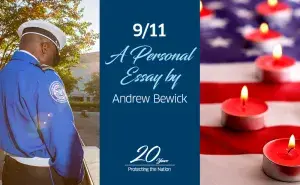
As we approach the 20th anniversary of September 11, TSA would like to rekindle that national unity and remind the next generation about why we serve. We asked TSA employees to submit a personal essay on how 9/11 impacted them, and how that has translated to their service to country and commitment to the TSA mission. You can view all essay submissions by visiting the TSA 9/11 iShare site from a TSA computer.
Together in Memory United in Mission
On the morning of September 11, 2001, I was in a study group at the National Defense University at Fort McNair in Washington, D.C. learning U.S. military strategy with senior civilian and military officers. Shortly after the news that a second airplane hit the World Trade Center, we heard an explosion and saw smoke rising from the Pentagon across the river. We knew something terrible was happening.
As we watched in horror, we were all itching to do something, but only a handful of classmates with medical experience were allowed to go to the Pentagon to help the wounded. Our Commandant, a USMC Major General, made an announcement the rest of us were in lock-down. We watched TV news and learned about Shanksville and the deadly toll.
A little later, I received a call the plane hit the Pentagon wedge where DIA had offices and one of my employees (Mike) was missing. His last known whereabouts had him commuting there for a meeting. His wife was frantic. I made some calls and learned Mike had forgotten his Pentagon badge that morning and turned around. A while later I found out 7 colleagues weren’t so lucky and died at the Pentagon, including a mentor – Chuck Sabin. Chuck was a pipe-smoking, senior executive who gave straight talk to eager-beavers like me.
A couple days after 9/11, I went to the Pentagon for a memorial. The building still smoldered and smelled of jet fuel. The destruction was appalling, yet it was inspiring to see a giant U.S. flag draped over the Pentagon. Inside, I ran into people I knew still stunned, one mumbling “how could this happen?” Another told me he and others crawled out of the building after it shook and filled with dark smoke. “Could you lend me your office?” he asked since his was destroyed.
Another said he saw the plane hit the building as he walked through the parking lot. A few months later, my NDU classmates & I visited recovery coordinators of ground zero in NYC and the Pentagon. Americans sure are a resilient bunch.
9/11 has been the impetus for most of my activities in the 2000s. Whether it was acquiring intelligence capabilities after 9/11; serving as a planner for Operation Iraqi Freedom; deploying to Iraq in support of the hunt for WMD; or delivering advanced technologies to help find, fix and finish targets, I promised never to forget what happened that September morning.
I joined TSA in 2009 with that idea in mind. I met with the NYC Harbor Police Chief in N.Y. the first 9/11 I was at TSA. He told me how transportation grant funding helped improve security. As I-STEP Program Manager, a program called for in the 9/11 Act, I’m proud of the amazing accomplishments men and women at TSA continue to achieve working in partnership with transportation operators to enhance security capabilities, build partnerships, and gain transportation security insight to prevent another attack on our watch.
Andrew Bewick
